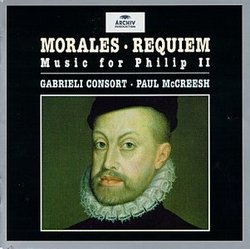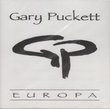| All Artists: Alonso Lobo, Cristobal de Morales, Paul McCreesh, Gabrielli Consort Title: Morales: Music for Philip II Members Wishing: 1 Total Copies: 0 Label: Archiv Prod Import Release Date: 6/9/1998 Album Type: Import Genres: Pop, Classical Styles: Vocal Pop, Opera & Classical Vocal, Symphonies Number of Discs: 1 SwapaCD Credits: 1 UPC: 028945759722 |
Search - Alonso Lobo, Cristobal de Morales, Paul McCreesh :: Morales: Music for Philip II
 | Alonso Lobo, Cristobal de Morales, Paul McCreesh Morales: Music for Philip II Genres: Pop, Classical
This is arguably the most impressive recording the Gabrieli Consort has ever made. Here you have a low-voiced choir, accompanied only by a bassoon, singing more than an hour of music that is austere even as funeral masses ... more » |
Larger Image |
CD DetailsSynopsis
Amazon.com essential recording This is arguably the most impressive recording the Gabrieli Consort has ever made. Here you have a low-voiced choir, accompanied only by a bassoon, singing more than an hour of music that is austere even as funeral masses go--yet it all sounds positively gorgeous. Paul McCreesh's tempi are slow, but his sensitive phrasing and dynamics keep the music from ever seeming static. Where most groups rush through plainchant passages as if they'd rather not have to do them at all, these musicians take the chant seriously--and make it sound integral to the music rather than like boring but obligatory preliminaries. As usual, McCreesh sets the music in liturgical context (a memorial Mass for Philip II of Spain); the liturgy itself seems a work of art--for example, the gospel lesson (Jesus and Martha after the death of Lazarus) is unexpectedly touching. McCreesh has taken music that can seem forbiddingly sober and shown it to be mournful, powerful, serene, and sweet. --Matthew Westphal Similar CDs
|
CD ReviewsMy favorite McCreesh recording hcf | 03/29/2000 (5 out of 5 stars) "Even by Paul McCreesh' high standards, this recording is a marvel. The generous acoustics, the bass-heavy chorus, and the dark accompaniment of a Spanish dulcian (called Bajon) create the hair-rising sonority that is so symbolic of the profundity of death. The choral sound is very open, in a characteristically Spanish way; it comes close to being a "wall of sound," but the textual detail remains traceable. In fact, the more austere the general mood of the work, the more effective are the sections in which the intensity of individual lines is more evident (e.g., Offertorium and the Osannas). The structure of the mass, with the highest and the lowest voices being generally more static than the voices in the middle, seems designed to highlight the value of fleeting human existence in the middle of perpetual dichotomies. As is usual with McCreesh, the mass is placed in its proper liturgical context (and the quasi-improvized choral chants are not even boring!). The disc ends with Alonso Lobo's magnificent motet Versa est in luctum, notable for its high-flying top line." Spanish Music of 16th Century Capt. B. Peterson | Oceanside, California | 05/22/2001 (5 out of 5 stars) "Cristobal de Morales is considered one of the most influential Spanish composers of the great imperial century of Spain, beginning in 1492 with the fall of Granada, last Moorish kingdom in Spain, to Ferdinand of Aragon and Isabel of Castille, and ending in the 1590's with the death of Phillip the Second and the bankruptcy of the Spanish crown. The famous events of this century in the Iberian world include the voyages of Christopher Columbus, the conquest of Mexico by Hernan Cortez (1591-21), the darker conquest of Peru by Pizarro, the famous battle of Lepanto in 1571, in which the allied Catholic fleets of the Mediterranean under the command of Don Juan de Austria (brother of Charles V) defeated the Ottoman Turkish fleet on the west coast of Greece (a battle in which the young ensign Miguel de Cervantes Saavedra became partially and permanently disabled), the several armadas which Phillip II sent against England, the independence of the Netherlands under William the Silent, and the final disillusionment of Spain with the outcome of an age in whose beginning so much promise had been seen. Cristobal de Morales' work is shaped by the predominant importance of religious composition in 16th Century Spain, with this requiem representing one of the high points of this school of composition. Based on historical research, it is deemed most likely that this requiem was performed at the requiem services for both the Emperor Charles V of Hapsburg in Toledo, and his son Phillip II of Spain. This work was performed in Mexico City at the reqiuem masses for both kings, and should be heard in the context not only of the influence of Spanish composition on the New World, but also in the context of the tremendous aptitude of the pre-Columbian peoples of New Spain for the European music to which the Castillians and Portuguese exposed them, an aptitude which is touched upon in the film "The Mission" (although in the South American setting, but no less true of the peoples of Mexico and Central America). The audio quality of this album is excellent and the high quality artistic direction and performance of this work are an outcome of decades of increased interest and recording activity in the European Community in the area of early music. This recording is a must for any student of choral and early music or the artisitic and cultural ambiance of 16th Century Mediterranean Europe and New Spain." MERCY AND JUSTICE Tony L. Engleton CNMT | COLVILLE, WA USA | 02/03/2006 (5 out of 5 stars) "There was a time, before cell phones, before i-pods, even before fax machines, when the soul of a faithfully departed man or woman was sent off to the judgment of God with all the beauty and mystery of the old Roman Catholic funerary rite. Based largely on the fact that Jesus mentions the finality of hell far more often than the hope of heaven, the Church, over the ages, devised the solemn penitential requiem. She ministered to all souls, the great and the not so great, and simultainiously, reminded all who would listen that the end is not for us to know. The natural, or should I say, the super-natural end of all humans is our return to out Heavenly Father. There is great comfort in this thought, but no earthly certainty. Hence, the requiem is centered around our plea for mercy for our loved one and, assisted in devotion and reverence, Holy Mother Church does all in her power to beg forgivness for sins commited and goodly deeds ommited on behalf of the deceased. Although the concept of congregational prayers for the dead is probably nearly immosible to date with any real accuarcy, we can say that the massed effort of litugy, and accomanying hymns and motets, have generally been of a subdued, reserved and wholly proper nature befitting the profound event at hand. The results are a synthesis of words and music, so holy, so moving and so orthodox, that one's soul might say, "surely, Lord, there is room in Your house for just one more."
Christobal Morales, I think, may have felt just that way. And, even if he didn't, he knew the nature of the true and tradtional requiem mass--he knew it in his heart and in his mind. He wrote not for audiences, nor for royalty (though, indeed, Philip II may have benefited directly from Morales' gifts). No, he wrote for the dead. He also wrote for the Church, essecially if one considers the ecclesiastical turmoil in cen tral Europe at this time. I think it was St. Augustine who said, "He who sings, prays twice." Enough said--well said. This is one of the very best recordings of any type of music, from any age, by any performers currently in my library, not only for the message of Morales, but also for the stunningly rich, resonant and unquestionable beauty of this recording, this is one of my handful of priceless treasures. It should be one of yours, as well. In 1999, I was giving a 4 day music seminar in Northern California, and I spent an afternoon examining the musical development of the requiem. After the thunder of Verdi and Berlioz, the richness and warmth of Durulfe and Faure and the touching humanity of Brahms, I was asked the obvious question. "Which requiem would you prefer for yourself, or a loved one?" My reply was Morales and I could not recommend any work as much as I now recommend this one. " |

 Track Listings (19) - Disc #1
Track Listings (19) - Disc #1
